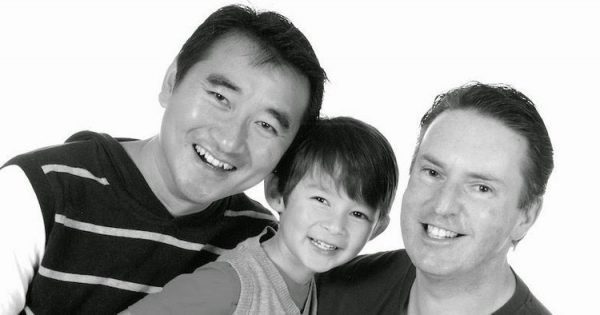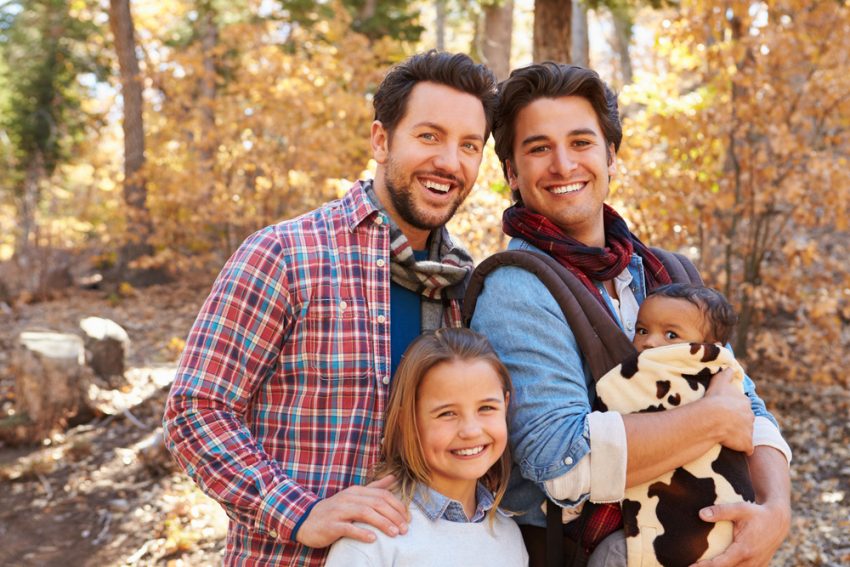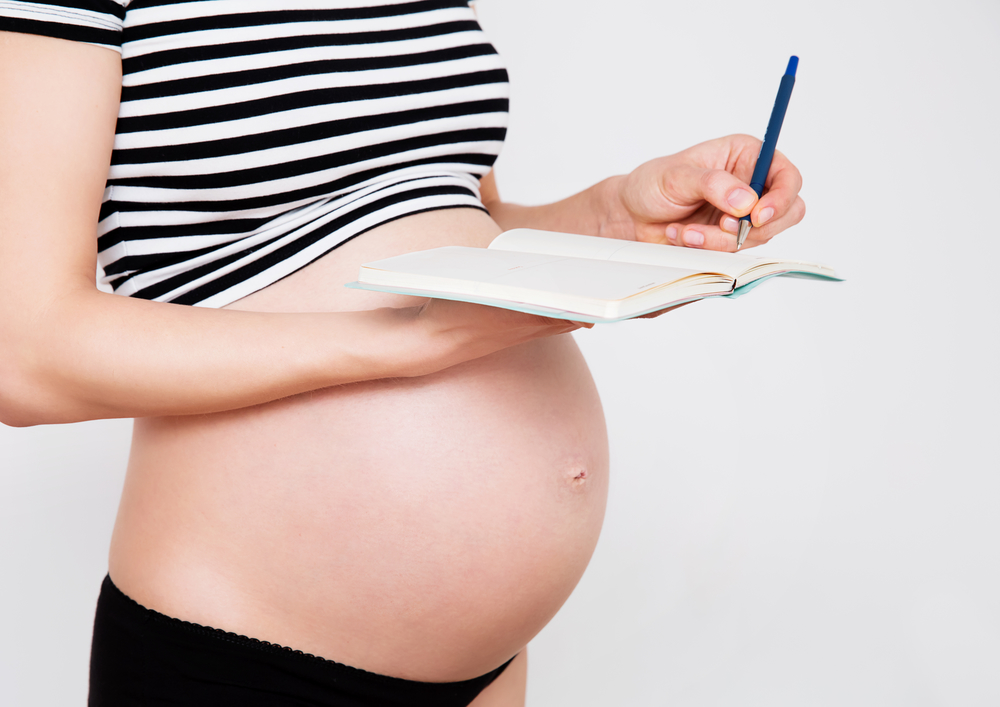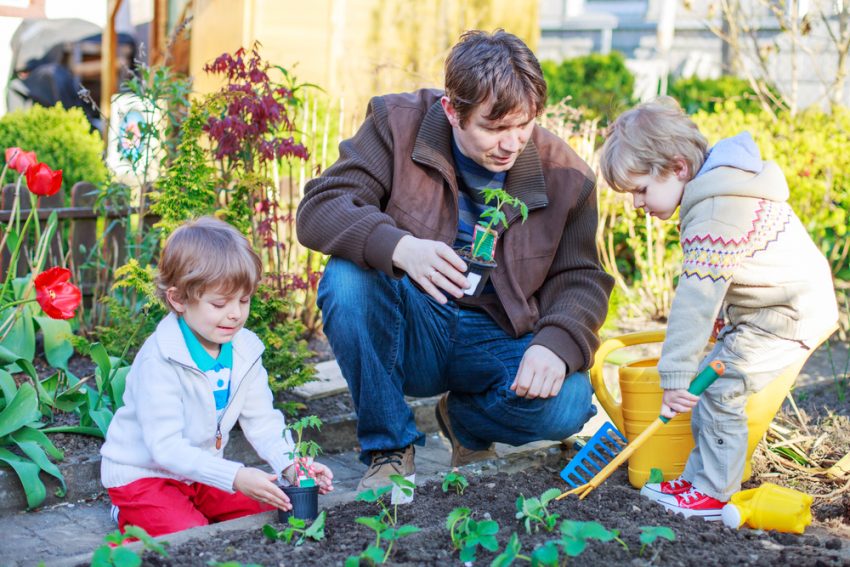By Jacqui Tomlins, as seen under Rainbow Families
Gay men are taking an increasingly active role in parenting through fostering, co-parenting and surrogacy. In recent years, the increased prevalence of out gay dads has helped raise awareness and drive a positive shift in community attitudes. Rodney Chiang-Cruise talks about the challenges and rewards of being a gay dad – and highlights some of the specific issues they face.
How different is it being a gay dad?
Being a dad – irrespective of how you identify your gender or sexuality – involves all the same hopes and fears, and all the joy and excitement, too. So much of what we do every day is just parenting and the fact that you’re gay or trans or straight is irrelevant. That said, there are some unique challenges for gay dads, but most of the time they can be overcome with some care and a positive attitude.
Many rainbow families find the people in their immediate community – teachers, neighbours, coaches – are really supportive, and that most of the negative stuff they hear comes from the TV. The people who oppose us have a big platform and a loud voice, but it’s important to remember that they are actually a minority and that most people are either supportive of our families or just don’t care. Lots of people are on our side. In general, being a gay dad is awesome and the positives outweigh the negatives a million to one.
Tell me about the positives
Lots of men give up the idea of parenting when they come out and, historically, that was right; before this generation, it was almost impossible to be a gay dad, unless you had a child from a former heterosexual relationship. It’s still not easy, but gay men can foster and adopt, they can co-parent, they can use domestic, altruistic surrogacy, or – if they can afford it – international surrogacy. I think lots of gay men actually enjoy the fact that they are breaking the mould, that they are broadening the idea of what it means to be a gay man. And our mums certainly love it! They crossed off grandchildren when we came out and then here we are asking if they can babysit. Then there are just all the highs you get with having kids: watching them compete in the swimming carnival or discovering they have a talent for music. And the little things, too; I loved the fact that both of us got to feed our son when he was baby.
And what’s the best way to deal with the negative stuff?
I strongly believe that as parents we must always be strong, confident, out and proud. This is really important. Our children take their lead from us and if we celebrate and affirm our families and are outwardly and obviously proud, our kids will be, too. And the opposite is true; if we are hesitant, doubtful, or closeted, our kids will pick up on that and will wonder what is wrong with their family. We need to show our kids that they have awesome, wonderful families and that, like their parents, they can be completely proud of their family.
We are part of the first generation of gay men who are creating our own families, and I think that automatically makes us advocates, whether we like it or not. It’s probably another generation at least before gay dads are more commonplace, which means we all have to take the lead on this. And that’s for our own children, the children of other LGBTIQ families and all the families that come after us.

What are some of those specific issues?
None of these issues are especially huge in themselves, but they can be annoying or insulting, or worse – and they can reinforce an idea that we’re not meant to be parents, that there is something wrong with us as parents. I think it’s important to be mindful of this stuff, but not stress about it too much or go looking for it. But having a heads-up – knowing what’s out there – can be helpful.
Health professionals
One of the common problems gay dads have is finding health professionals who are supportive and inclusive. It’s like a doctor will go looking for the mother and when you explain your child has two dads they react badly and that’s frustrating and insulting. It can be helpful to ask around your social circle for a referral to someone who’s known to be supportive, but that’s not always possible. If you do have a bad experience, and you have a choice, go somewhere else. But don’t forget to tell them why; change only happens when people are aware of the problem.
‘Bio’ and ‘Non-bio’ dads
While adults often stress about bio and non-bio parents, kids don’t. Focusing too much on who’s bio and who’s not can be really counter-productive and if you get bogged down in this I think it’s really helpful to go back to the child’s perspective. For them, you are both parents, you are both raising them and they love you both as a dad. For many years, they won’t even know or understand about the biology, and when they do, they won’t really care. I know non-bio dads are sometimes anxious about this at the start, but once you get into full-time parenting, you don’t have time to worry about it! I think it goes away on its own.
Co-parenting dads
Co-parenting can be a great way for gay men to be dads and there are many successful co-parenting families out there. The guy gets to build a relationship with a single woman/lesbian couple and be involved in a child’s life, and the child has more people to love and take care of them. Co-parenting is complex, though, and involves way more than donating sperm and agreeing to how often you’ll see each other. I always say take a long time to work it all out and get some professional help from specialist counsellors and lawyers. It’s a lifelong relationship between all the parties, and that relationship needs to be healthy and respectful and have the capacity to deal with change and potential conflict in a constructive way.
Where’s mum?
Gay dads often hear the comment, ‘Oh, you’re giving mum the day off!’, or something similar. You are going to encounter assumptions about family structure and gender roles all the time and it’s annoying. I believe the best way to respond to these situations is with complete honesty: ‘Our daughter has two dads’. Our son doesn’t have a mother. Honesty is disarming and most people feel slightly embarrassed to have made assumptions. It’s a teaching moment; it’s polite, it’s respectful, and everyone wins. And it’s especially important if your child is with you and old enough to understand. If you lie about or obfuscate your family structure or relationship with your partner, your kids will pick up on it. Never be ashamed or embarrassed. Again, you need to be proud and your child needs to see you being proud.

Thank you, Rodney (and Jeff and Ethan for the great pic)
Invasive questions
One of the really common things is inappropriate or invasive questions. Surrogacy dads are often asked, ‘Who is the father?’ And when they say, ‘We both are’ they get, ‘No, I mean, who’s the real father?’ It’s not uncommon for this question to come from relatives, but friends, colleagues – even total strangers often ask it, too.
People think they have a right to know so they can identify the ‘real father’, but they don’t. I think it’s important to resist the temptation to give them this information, or to lie or to get angry. I find the best response is to tell them politely that you are both the fathers. I generally find that at this point they realise they’re out of line and stop.
I feel very strongly that this information belongs to your child. When your child is old enough to know and understand you can tell them. As parents, we have a duty of care to ensure they are the first to know. What they do with that information – who they tell – is then up to them. It’s their story and you have to let them run with it; you can’t control it. That makes some people nervous, but they don’t need to be. I think kids have a strong sense of privacy and know when it’s appropriate to talk about these things.
Parenting girls
There are lots of assumptions about gay men parenting girls. Who will do her hair? Who will explain about periods? What about female role models? This really is a non-issue. Parenting is not a function of gender; it’s a function of willingness and thought and care. Gay men are entirely capable of raising fantastic girls, as lesbians are entirely capable of raising fantastic boys. And sole parents of any gender or sexuality can also raise fantastic kids. I try to explain – again politely and calmly – that whatever it is they’re worried about won’t be a problem. I tell them our child has many positive influences and role models in their life.
Associations with paedophilia
Some people – thankfully very few these days – will try to associate gay men with paedophilia. This is hurtful and horrible and wholly unacceptable. Everyone will respond differently to this, but I think, for the sake of our kids, we need to call it out and challenge it wherever it occurs. If it happens in a work environment there should be procedures to deal with it. More often, though, it comes up on social media and I think it’s important to remind people that this is wrong, insulting and potentially defamatory. Often when this happens you’ll find other people will step in on your side and defend you.
And sometimes it’s more subtle than this. You might get odd looks and stares from strangers if you are with your kids at a park or at the pool. Mostly, it’s just easiest to ignore it and move on, but there may be an opportunity to politely engage with that person. You may be surprised to find that they are genuinely interested in how you created your family and judgment recedes quickly.
You may also like to read:






